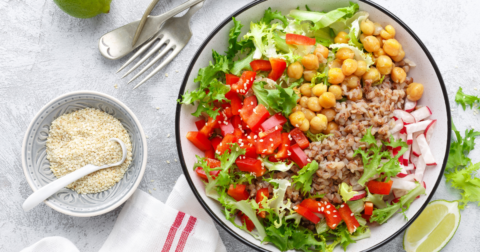Fact Check
There Is Nothing Especially Healthy About Regenerative Meat
Health•4 min read
Explainer
A plant-based diet isn’t the same thing as being vegan. Here’s how it differs.


Words by Seth Millstein
If you eat animal products with any regularity, the prospect of switching to a plant-based diet may feel daunting. Meat, dairy and eggs are central to most meals in the West, and figuring out how to replace them with plant-based alternatives might seem like a dizzying task. But it doesn’t need to be. Thanks to increased public interest in alternative diets, going plant-based is now easier than ever. If you’re interested in transitioning to a potentially healthier and more ethical diet, a plant-based diet just might be the right choice for you.
“Plant-based” encompasses several different types of diets, but in the broadest sense, a plant-based diet is one that’s made up mostly or entirely of plants.
This can take many different forms. Some people on plant-based diets won’t eat any animal products whatsoever; some will eat only a certain type of animal product, while others will consume all animal products, but only in small amounts. What ties all plant-based diets together is the minimization or elimination of animal products from the diet, and the centralization of plants and plant-derived ingredients.
Plant-based diets certainly can be vegan, but they don’t have to be. There are several different types of diets that can qualify as plant-based:
Many of these diets have subvarieties as well. For instance, raw vegans only consume foods that don’t need to be cooked, fruitarian vegans primarily eat fruit, and whole food vegans don’t eat processed foods. Ovo vegetarians eat eggs but not dairy, lacto vegetarians eat dairy but not eggs, and lacto-ovo vegetarians eat both. In short, plant-based is a flexible diet that takes many forms, and there’s no one “right” way to do it.
Heart disease is the leading cause of death in the U.S., and the risk of succumbing to it can be greatly reduced by adopting a plant-based diet.
A long-term study that followed over 16,000 participants for approximately nine years found that those who followed a plant-based diet had a 41 percent lower risk of heart failure than other participants. A different study that followed subjects over the course of 30 years found that plant-based diets were associated with a 57 percent lower risk of developing heart disease — though it’s worth noting that in this study, the plant-based diets in question excluded pastries, french fries and a few other foods that, while technically plant-based, are still generally unhealthy.
Adopting a plant-based diet is also correlated with lower risks of cancer. In one study in 2017, vegetarians were eight percent less likely to develop cancer than their carnivorous counterparts. For vegans, the risk of getting cancer dropped by 15 percent.
Plant-based diets have been shown to improve brain power. A 2020 study with over 3,000 participants found that people who followed a plant-based diet performed better on several cognition tests, including those measuring memory and pattern recognition, than people who didn’t.
Research has shown that plant-based diets can be excellent for managing Type 2 diabetes, in large part because they’re generally low in fat. In one study, 37 percent of patients on plant-based diets achieved full diabetes remission, while another study found that plant-based diets are three times more effective at controlling blood sugar levels than traditional diabetes treatments. Plant-based diets can also reduce a person’s insulin resistance, which is of enormous help to diabetes patients. Plant-based diets also reduce the risk of obesity, which itself is often a precursor to diabetes.
If you’re looking to lose weight, adopting a plant-based diet is a great place to start, as multiple studies have shown that veganism and vegetarianism can both promote weight loss and BMI reduction.
Though plant-based diets come with a plethora of health benefits, they do have a few downsides as well.
There’s no denying it: plant-based diets aren’t as convenient as the alternative. Meat is still central to most people’s diets, especially in the West, and modern society reflects that. Even in the most progressive cities, it’s usually at least a little easier to find omnivorous food options than plant-based ones, especially when it comes to dining out.
But plant-based diets have surged in popularity over the last few years, and with it, so has the availability of plant-based food. Many of the biggest fast food chains now offer plant-based meat alternatives or fully vegan meals, including Burger King, Taco Bell, White Castle, Carl’s Jr., Del Taco, Chipotle and Subway. Starbucks and Peet’s Coffee both sell plant-based breakfast sandwiches, and Baskin-Robbins and Dairy Queen offer dairy-free desserts for their plant-based customers.
Of course, you don’t have to eat out to find delicious plant-based meals, and it’s probably easier and cheaper not to. Sales of plant-based meat substitutes have stagnated since the pandemic — but interestingly, the number of Americans adopting plant-forward diets has increased over that same period of time. This means that more and more Americans are going plant-based the old-fashioned way: by buying, preparing and eating plants.
There’s a practically unlimited supply of delicious plant-based recipes, and with the number of farmer’s markets in the U.S. at an all-time high, it’s easier than ever to find fresh, locally-grown produce to prepare at home.
No matter what your diet is, it’s crucial to make sure you’re getting enough nutrients to stay healthy. Plant-based diets are no exception; despite their many health benefits, there are a couple of things to pay attention to if you’re thinking of adopting a plant-based diet.
Some research shows that people on plant-based diets are more likely to be deficient in Vitamin B-12, while vegans in particular are susceptible to Vitamin D and calcium deficiencies. Vegans also tend to consume less protein than those on other diets.
Thankfully, none of these risks are insurmountable. Vitamins B-12 and D can both be obtained through supplements, as can calcium, and despite popular conceptions to the contrary, there are plenty of ways to get sufficient protein without eating animal products.
Although almost everybody stands to benefit from a plant-based diet, some folks should take caution before adopting one. If you have irritable bowel syndrome or a history of kidney stones, many staples of plant-based diets will be off-limits to you, which will make it more difficult to adopt.
Starting a plant-based diet can be challenging, but with a little bit of forethought and planning, it’s not as difficult as it might seem. Here are a couple of steps to get you started.
As mentioned earlier, there are many different ways to go plant-based. Before you change any of your dietary habits, it’s good to decide which variety of plant-based diet you’d like to adopt. Don’t stress too much about this, though, as you can always change your mind later on.
Although some have success switching to plant-based diets in one fell swoop, it’s generally advised to transition slowly out of an omnivorous diet to give your body time to adjust to the change. One way of doing this is to eliminate foods from your diet one-by-one, over the course of several months; for instance, you might stop eating beef in October, then remove chicken from your diet in November, and so on.
Another option is to go plant-based on a “part-time” basis in the beginning — only on weekends, for instance, or only when cooking at home — before gradually implementing it into all of your meals.
Regardless of which option you take, you’ll have plenty of resources to make the transition as easy as possible. The Internet is full of guides for going plant-based, with everyone from the Mayo Clinic to Harvard Medical School providing tips and tricks to plant-based newbies. Another excellent resource is Happy Cow, a website and app that tells you which restaurants near you offer vegan and plant-based meals.
Depending on how much disposable income you have, it also might be worth looking into meal delivery subscriptions. Purple Carrot, Thistle, Hello Fresh and Hungryroot are but a few of the companies that will deliver plant-based meal boxes to your door, with all of the necessary ingredients and instructions on how to prepare them.
Unfortunately, many of these subscriptions are on the pricey side. But most of them offer free trials, and if nothing else, they can be great inspiration for creating your own vegan meals at home.
There are also an increasing number of vegan and plant-based influencers on social media. Turnip Vegan, Rachel Ama, Healthy Girl Kitchen and Merle O’Neil are just a few of them, and their channels can be a great resource for plant-based and vegan recipes.
When adopting any kind of new diet, it’s good to focus on the food you can eat, not the food you can’t. Plant-based diets are generally made up of some combination of fruit, vegetables, nuts, seeds, legumes and grains.
There are an infinite number of ways to combine the above ingredients, of course. To name just a few at random: Corn chowder, green bean pasta, spaghetti squash, red bean chili, avocado toast, falafel gyros and peanut butter and jelly sandwiches are all great plant-based meals. There are plant-based burritos, plant-based burgers, plant-based sushi, plant-based sandwiches and plant-based salads. If there’s a version of a dish with animal products in it, there’s almost certainly also a plant-based version as well.
One thing that any plant-based eaters should know is that veganism has been a part of Ethiopian culture for centuries, and as a result, a huge number of traditional Ethiopian dishes are vegan. A staple of Ethiopian cuisine is injera, a type of thin bread made from teff grains that plays a similar role as naan does in Indian food, and many Ethiopian dishes are essentially a large piece of injera with various beans, lentils, vegetables and sauces on top of it.
All of this is a long way of saying that if you’re looking for an authentic plant-based meal that isn’t attempting to imitate meat, the nearest Ethiopian restaurant may be your best bet. Many Indian, Thai, Vietnamese and other Asian restaurants are also likely to have vegan options available.
The world of plant-based eating is in a period of significant growth. Restaurants around the country are regularly adding plant-based options to their menus, plant-based chefs are gaining increasing visibility on social media, and plant-based companies are expanding the reach of their plant-based products every year. If you’ve been thinking about adopting a plant-based diet, there’s never been a better time to try it out.